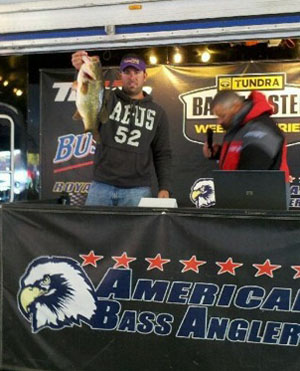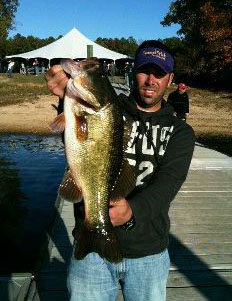Co-Angling Tactics
by Trey Blocker
 Adam Hunt showing off the 7.3 lb bass he caught at the 2011 Toyota Tundra BWS National Championship in South Carolina
Adam Hunt showing off the 7.3 lb bass he caught at the 2011 Toyota Tundra BWS National Championship in South Carolina |
|
The trick to being a successful co-angler has nothing to do with luck or boater pairings. Obviously, fishing in productive water is a must, however; consistently catching fish on the back of the boat calls for far more skills, knowledge, and preparation than one may think. There are certain skills that must be acquired and concepts to be understood to entice "left over" fish, or fish that have already turned down an offering from the boater. Preparation, casting skills and technique, and knowledge of local conditions make for success and eliminate luck.
Insight from Adam Hunt, Swamp Stick Custom Rods owner/operator, 2011 Toyota Tundra Bass Master Weekend Series Division 13 Co-Angler of the Year, and 12th place overall finisher in the BWS National Championship in South Carolina, will help clarify some basic points in tournament co-angling tactics.
Preparation is one of the most important tools in any angler's arsenal, especially the co-angler. During the course of a day the pattern may change from slow rolling a spinner bait to top water, finesse, punching, cranking, etc. A boater has the luxury of having the boat as a tackle box and rod storage area, therefore; most boaters can usually be ready for whatever possible situations arise. A co-angler does not have that luxury, so one has to be ready for anything with only having a limited number of rod and reel combinations and lure selections.
"I bring about 4 or 5 rods and each rod can be used for a couple of different techniques, this way I can change lures but still get the rods intended performance for that type of lure", says Hunt.
Obviously, one couldn't efficiently fish a jig or punch with a rod designed for crank baits and cranking with a jig rod or punching stick would handicap the casting distance and performance of the crank bait. Rods designed for spinner baits can be used for soft plastics or small swim baits and crank baits, jig rods can be used for punching, and frog rods can be used for all other top water. Keeping it simple is important. Information about the type of water and lures that will be fished for the tournament collected from the boater will help hone in on exactly what to bring for that day.
The basic motor skills of casting, pitching and flipping are extremely important for a co-angler to become successful in tournament fishing.
"You got to remember your getting the left overs, the left over fish and the left over spots," Adam explains, "my boater may be trolling down the bank throwing a spinner bait and the spots he doesn't choose are mine, I don't have the luxury to slow down the boat to pick apart my areas so I have to be accurate" says Hunt.
 Adam Hunt with 7.3 lb bucket mouth
Adam Hunt with 7.3 lb bucket mouth |
Placing a lure in a desired spot multiple times while trolling down the bank is not the easiest task to accomplish so one must practice these skills routinely. It would be nice to practice on the water while fishing, but most anglers don't have the time or funds for that type of training, so grass casting may have to suffice. A great way to improve on pitching and flipping is to put a 5 gallon bucket over on its side and stand about 15 to 20 feet away and pitch in trying to land all the way in the back without touching any sides. This method will definitely help the angler gain more control of the lure during flight while keeping it low to the ground simulating what is needed on the water.
Fishing behind a boater can be an enlightening or frustrating experience. Sometimes the boater has done plenty of homework and knows exactly where to go and what to do to put quality fish in the boat. Others may have not put in enough time on the water and/or a climate change may have thrown off the pattern. Whatever the case, a good co-angler must be prepared.
"I always try to gather as much information as possible to establish some kind of understanding of the body of water being fished" Hunt adds. Completely depending on the abilities and knowledge of the boater is a recipe for disaster. "I always try to throw something different than my boater unless he's skull dragging em", says Hunt.
Throwing different baits than what the boater is throwing can attract a fish to strike that may have not been attracted to the first offering. For instance; the boater throws a spinner bait and the co-angler throws a crank bait, a fish that may not have struck the spinner bait may be attracted to the rattles and/or the different action of the crank bait or maybe the crank bait is undesired and they like the flash or vibration of the spinner bait. Scenarios like this happen all the time. Also, fishing like this can establish new patterns that were not previously known and maybe help create a good day out of a potentially bad one.
Most of the boaters in the tournament circuits that have paired co-anglers are trying to make the state team, Opens, Elites, FLW, and/or for a spot in the Bass Masters Classic. There is a lot of time and money invested in these tournaments by boaters trying to make it big or just trying to break even so remember, gas money is a must.
"You gotta understand and have the attitude that you're in their boat, fishing their pattern, catching fish they found," explains Adam, "I always bring cash for half the gas for the day of a tournament," says Hunt, who considers taking care of the boater as not only the right thing to do, but it also establishes a variety of networking opportunities for the years to come.
Co-angling is a fantastic way to gain knowledge of different bodies of water, different techniques, and experience in tournament fishing. Preparation is key considering the different variables of fishing that can be controlled by the co-angler like; the basic skills of casting, pitching, and flipping, researching to gain knowledge of the type of water and lures that will be fished, and efficiency in the rod and reel selection process that minimizes ones tournament day luggage while still allowing a diversity of lures to be fished. Although having a good boater combined with a little luck may do the trick every now and then, practicing these co-angling tactics will drastically improve ones chances at becoming a more successful co-angler.
About the Author: Trey Blocker is a pro angler and freelance outdoor writer in southern Louisiana. He competes in the Bass Master Weekend Series, other local circuits and charity tournaments. He is currently on team LOUISIANA FISH FRY, with other sponsors including SWAMP STICK RODS, and ROBELOCKER FISHING. Trey owns his own lawn and landscaping business named Blocker Landscaping and loves to cut grass and catch bass.

